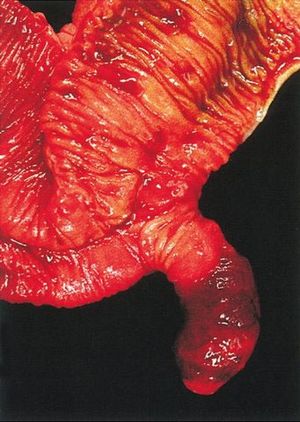Meckel diverticulum
Jump to navigation
Jump to search
Meckel diverticulum (also Meckel's diverticulum), is congenital structure of the distal small bowel that occasionally gets inflamed and may present with acute appendicitis-like symptoms.
| Meckel diverticulum | |
|---|---|
| Diagnosis in short | |
 Gross image of a Meckel diverticulum. (AFIP/WC) | |
|
| |
| LM | small bowel mucosa, +/-gastric mucosa (foveolar epithelium, oxyntic mucosa), +/-pancreatic epithelium |
| Gross | small bowel outpouching on antemesenteric aspect ~5 cm long, ~60 cm from the ileocecal valve |
| Site | small intestine |
|
| |
| Symptoms | abdominal pain |
| Prevalence | uncommon ~2% of population |
| Prognosis | benign |
| Clin. DDx | acute appendicitis, other causes of abdominal pain |
| Treatment | surgical removal |
General
- Most common congenital anomaly of the gastrointestinal tract.[1]
- Remnant of the omphalomesenteric duct - a connection of the yolk sac and midgut.
The rule of 2s:
- 2 feet from the terminal ileum
- 2% of the population
- 2% symptomatic.
- 2 inches long.
- 2 year old.
- 2 types of epithelium - gastric and pancreatic.
Main clinical DDx of a symptomatic Meckel diverticulum:
Gross
- Antimesenteric attachement, i.e. a Meckel's diverticulum hangs off the side opposite of the mesentery.
Image
Microscopic
Features:[1]
- Small bowel mucosa.
- +/-Gastric mucosa:
- Foveolar epithelium: champagne flute-like columnar epithelium.
- Oxyntic mucosa: parietal cells (pink) and chief cells (purple).
- +/-Pancreatic epithelium:
- Pancreatic acini.
Images
Sign out
Small bowel with Meckel's diverticulum, Excision:
- Small bowel diverticulum with mild focal active inflammation and
reactive lymphoid hyperplasia at tip, compatible with clinical impression of Meckel's diverticulum.
- Unremarkable small bowel wall.